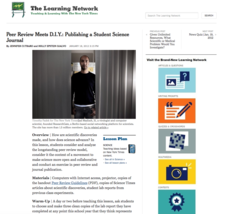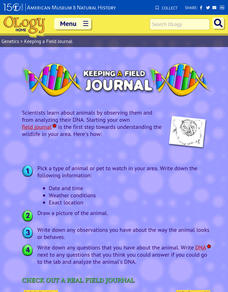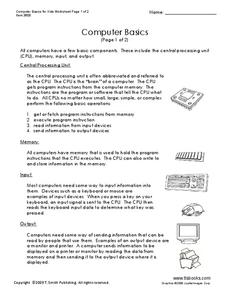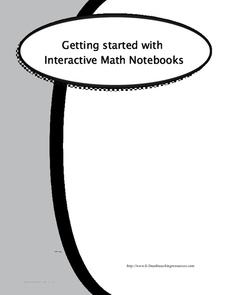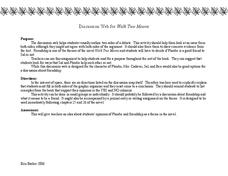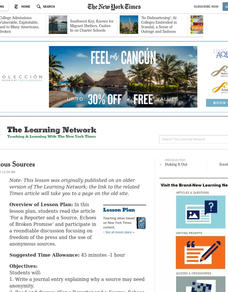Curated OER
Peer Review Meets D.I.Y.: Publishing a Student Science Journal
Peer review of science laboratory reports? You bet! First, learners work in pairs to review a scientific article. Then they trade lab reports for peer review. The end result is the publication of a classroom scientific journal!
American Museum of Natural History
Making a Field Journal
Trowels and brushes are certainly important tools for an archaeologist working on a dig. Perhaps more important, however, is the archaeologist's field journal. Christina Elson, an archaeologist working with the American Museum of Natural...
Curated OER
"The Most Dangerous Game" Study Guide Packet
The comprehensive study guide packet for Richard Connell’s "The Most Dangerous Game" challenges young readers to reflect on hunting as a sport and what it means to be civilized. Using various graphic organizers, including a Cornell Notes...
EngageNY
How to Write Like a Scientist in the Field: Introduction to the Elements of Field Journals
It's time to start journaling. Scholars look at examples of science field journals. They work in pairs to examine and complete a note catcher about a field journal. They then add to an anchor chart by discussing the different features...
American Museum of Natural History
Keeping a Field Journal
Young scientists begin a field journal by following four steps. A real-world example of an entry showcases the different parts, including location, date, drawings, and more.
Curated OER
Student Opinion: When Did You Have a Great Conversation?
Conduct a classroom conversation about communication using this resource as a jumping-off point. For this The Learning Network activity, learners read an excerpt from The New York Times opinion piece, "The Flight From Conversation," and...
T. Smith Publishing
Computer Basics for Kids Worksheet
This informational reading worksheet can be used in your literacy or computer class. Learners learn the basic components of computers then test their knowledge with multiple choice and fill-in-the-blank questions.
Curated OER
Getting Started with Interactive Math Notebooks
Set young mathematicians up for success with this interactive math notebook. Including a list of rules and expectations for using the notebooks, as well as templates for a creating a cover page and table of contents, this resource...
Freeology
Nature Observations Journal
A journal template makes observing nature a breeze. Super scientists identify an interesting object in nature, draw it, list its details, and compose a written descriptions of their artwork.
Poetry4kids
How to Start a Poetry Journal
Practice makes proficient! Using a journal of their choice, authors organize pages, then begin their writing journey of on-going writing practice in which they compose all poetic forms including diamante, limerick, free verse, and more!
Curated OER
A Better Class of Journal-ists
Young academics create a current events journal by skimming newspapers for articles that fit defined guidelines for informational texts. After cutting out two articles each week to add to their journals, they write a brief description of...
Curated OER
Double-Entry Journal Writing
Introduce your learners to the concept of a double-entry journal. Talk about how to connect with the text and model an example for them. Using whatever literature you are working with, have scholars choose a quote and make their own...
Curated OER
Fast Food Nation: Study Questions
Are you introducing your class to the horrors of eating unhealthy? This lesson contains 24 reading comprehension questions relating to the non-fiction book. Readers are encouraged to copy these and answer them in their reading journals.
Curated OER
Sign of the Beaver: Book Club Discussion
Good question are the heart of great discussions. To prepare for a book club discussion, introduce young readers to the characteristics of good conversation-starting questions. Practice crafting questions for a text the class has...
Berkshire Museum
Nature Journaling: Experience the Outdoors Through Writing and Drawing
Step into the great outdoors and develop young scientists' skills of observation with a nature journaling lesson. Given a specific focus or goal, children practice making and recording observations of nature through written descriptions...
Curated OER
Reaching Students through Literacy Centers
Continue the celebration of literacy this month by integrating reading centers into the classroom.
Reproducible Master
Reader’s Journal
As you read a story or novel, have your class members put together and fill out a journal. They will have the chance to illustrate a cover page, draw and write about various topics, respond to a focus questions, and draft a paragraph.
Curated OER
Walk Two Moons: Discussion Web
Is Phoebe a good friend to Sal or not? After reading chapters twenty-five and twenty-six of Walk Two Moons, class members use the provided graphic organizer to develop an argumentative piece. Writers must decide if the two main...
Curated OER
The First (and Last) Words
What does "freedom of speech" mean to your class, especially in the context of Internet communications? In round-table discussion format, middle and high schoolers address the issues discussed in "State Legislatures Across U.S. Plan to...
Curated OER
Anonymous Sources in the Media
When do people ask for anonymity? Why? After reading the New York Times article "For a Reporter and a Source, Echoes of Broken Promise," young readers participate in a roundtable discussion focusing on freedom of the press and the use of...
Curated OER
Shame on You!
Should public humiliation be an acceptable consequence for a crime? Have your middle schoolers engage in a round table discussion about the recent resurgence of the use of public humiliation as a punishment for crimes in the United...
Curated OER
Good for Goodness Sake?
After discussing their opinions of performing community service, young learners read an article about different benefits of serving the community. They participate in a debate about whether their school should require pupils to perform...
Curated OER
Seedfolks Q & A Journal
Enrich your study of Seedfolks by Paul Fleischman by pairing it with a journal. The journal is made up of questions that correspond with each part of the story. As they read, pupils can respond to the questions. Great for a homework or...
British Council
Class Journals
Who are you? Scholars draw a shield on the front of their journals that includes four items with which they identify and discuss them with a partner. Readers then use topic suggestions from the board to write about themselves on the...


